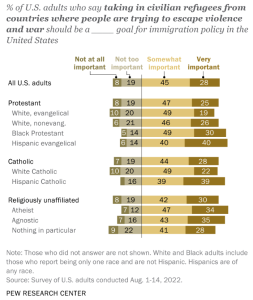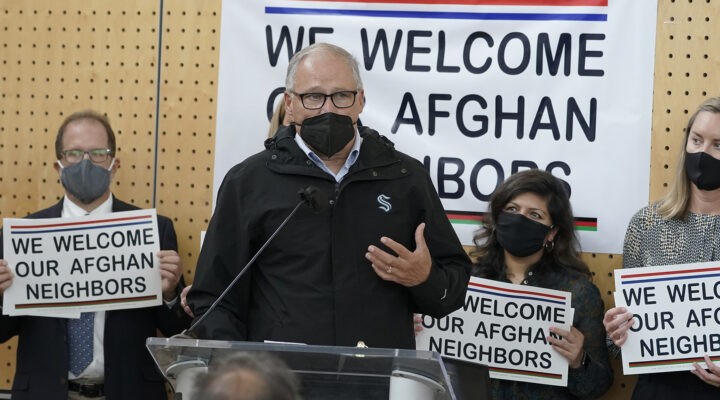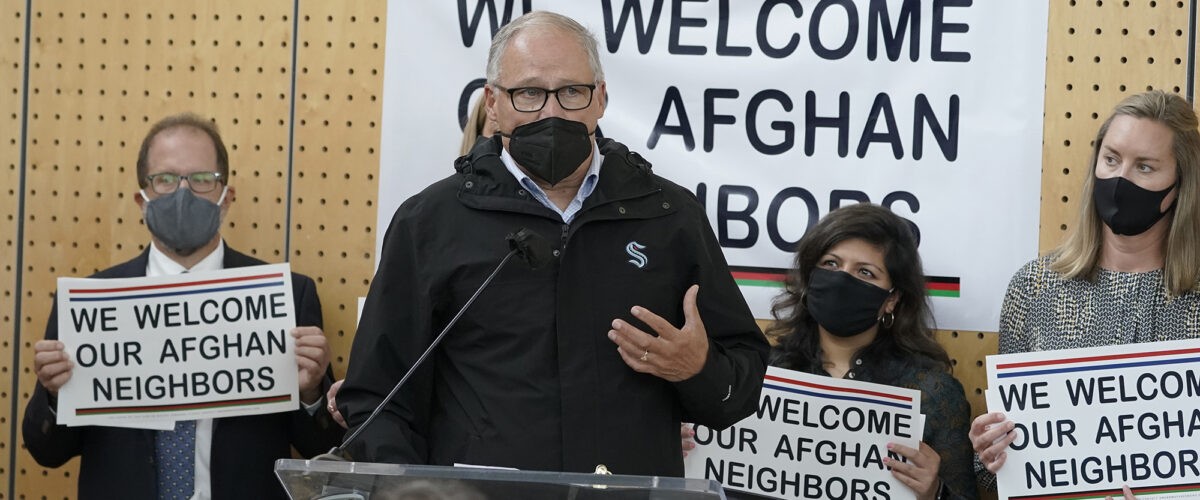Research into American attitudes about welcoming Afghan, Ukrainian and other refugees into the nation confirms how closely religion, race and politics have become intwined in the United States.
“For instance, Hispanic evangelicals, Black Protestants and white nonevangelical Protestants are all more likely than white evangelical Protestants to say accepting refugees should be very important,” Pew Research Center said in survey analysis released Sept. 19. “This at least partly reflects the partisan composition of these religious groups, with white evangelicals much more likely to identify as Republicans than Democrats.”
Pew said the research was conducted to track attitudes toward refugees in light of the Taliban takeover of Afghanistan in 2021, violence and social upheaval in Central America and the war in Ukraine.
 “Against this backdrop, around seven-in-10 Americans (72%) say taking in civilian refugees from countries where people are trying to escape violence and war should be a very or somewhat important goal for immigration policy in the United States. But only 28% say this should be a very important priority. … And opinions on this question vary by party, race and ethnicity, and other factors.”
“Against this backdrop, around seven-in-10 Americans (72%) say taking in civilian refugees from countries where people are trying to escape violence and war should be a very or somewhat important goal for immigration policy in the United States. But only 28% say this should be a very important priority. … And opinions on this question vary by party, race and ethnicity, and other factors.”
Religion was a telling factor when respondents were asked to gauge the importance of taking in civilian refugees escaping violence and war in other countries.
Among Protestants, African Americans and Hispanic evangelicals were most likely to say this is very important, at 30% and 40%, respectively, and somewhat important at 49% and 40%. White evangelicals, at 19%, said it’s very important while 49% answered that it’s somewhat important. White nonevangelicals responded at 26% (very) and 46% (somewhat), the survey found.
Overall, 25% of Protestants said it is important to welcome refugees and 47% said it is somewhat important.
Among Catholics, 28% of Hispanics answered that taking in refugees is very important, compared to 22% of whites. As a whole, 28% of Catholics concurred with that answer while 44% said it is somewhat important.
“Hispanic Catholics are nearly twice as likely as white Catholics to say taking in refugees should be a very important policy goal.”
In its analysis, Pew said it uncovered some differences among Catholics on this issue. “Hispanic Catholics are nearly twice as likely as white Catholics to say taking in refugees should be a very important policy goal for the U.S. (39% vs. 22%).”
When they were asked to rate the importance of taking in refugees, 30% of religiously unaffiliated Americans said very important, compared to 42% who replied somewhat important.
“Many religious leaders, including Pope Francis, have long advocated for compassion for migrants and refugees, with some Christians citing biblical on the topic. But some Christian subgroups are more likely than others to say the U.S. should prioritize welcoming refugees,” the report explained.
Partisanship also was a major factor in how Americans responded to the survey. “About four-in-10 Democrats and independents who lean toward the Democratic Party (41%) say taking in refugees should be a very important policy goal, but just 13% of Republicans and GOP leaners agree,” according to the analysis.
“Partisan differences on this question generally are larger than demographic differences.”
“Partisan differences on this question generally are larger than demographic differences. But women are somewhat more likely than men to say that taking in refugees who are trying to escape violence should be a very important goal for the U.S. (32% vs. 24%). And Hispanic adults (38%) — just under half of whom are immigrants themselves — are more likely than white (25%), Black (30%) or Asian Americans (26%) to voice this opinion.”
Pew added there are key differences among Hispanics on the question of refugees. “Hispanics who were born outside the U.S. are more likely than U.S.-born Hispanics to say taking in civilian refugees should be a key U.S. policy goal (44% vs. 33%). Similarly, those who say their Hispanic identity is extremely or very important to how they think about themselves are much more likely to say this should be a very important policy goal than those who say their Hispanic identity is less important to them (45% vs. 27%).”
Education and income, however, were not found to be significant dividing lines on how Americans responded to the survey question. Age was also not a major determining factor.
Related articles:


